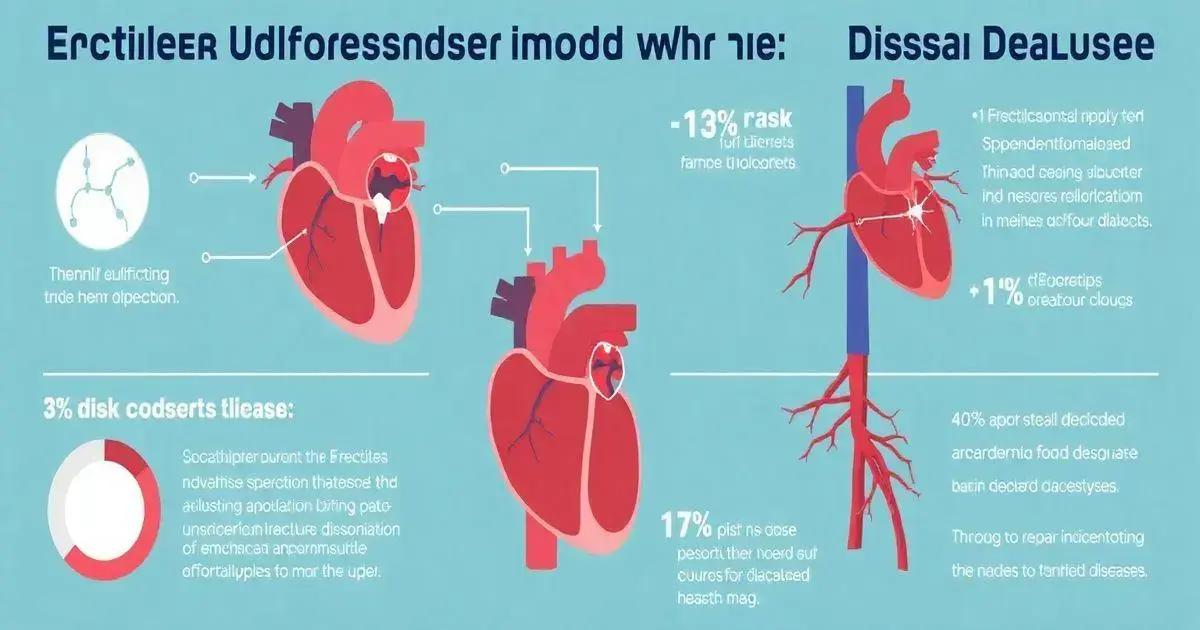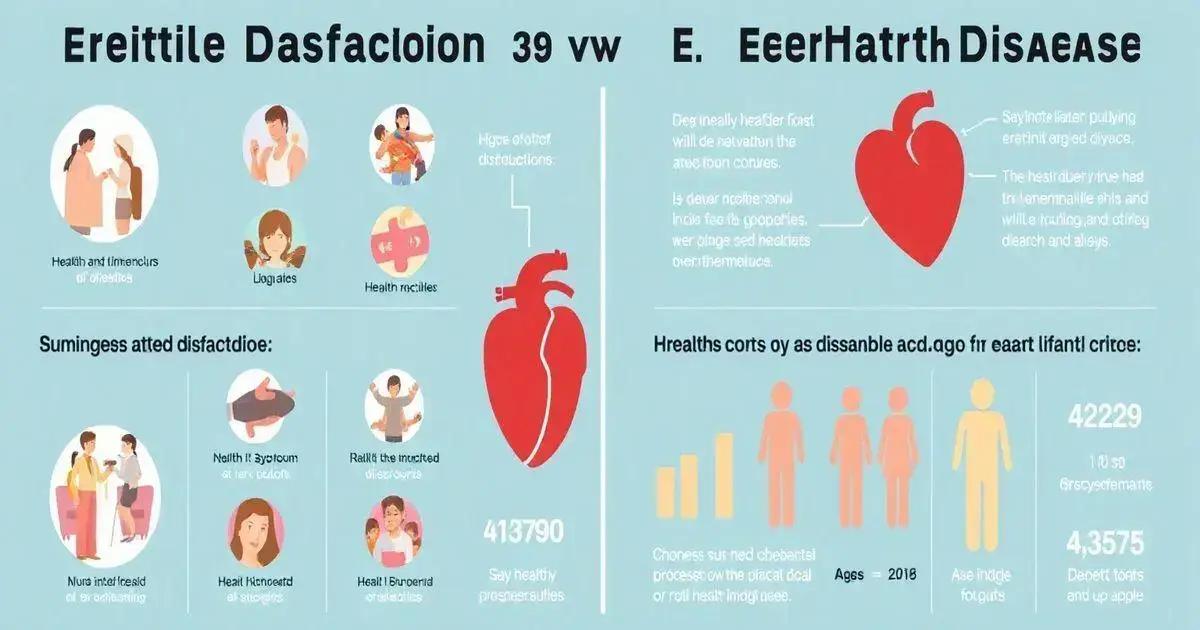Erectile dysfunction can be a sign of early heart disease due to shared risk factors like poor blood flow and diabetes. If you experience persistent ED, especially with symptoms like chest pain, it is crucial to seek medical advice for early intervention. Adopting a healthy lifestyle with balanced nutrition, regular exercise, and stress management can improve both erectile function and heart health.
Many men experiencing erectile dysfunction (ED) may wonder if it signals a deeper health issue, such as early heart disease. Research indicates a significant link between sexual health and cardiovascular health; thus, men should not overlook symptoms of ED. In this article, we delve into how erectile dysfunction can serve as an early warning sign for heart disease, what underlying factors contribute, and when to consult a healthcare professional. By understanding this connection, men can take proactive steps toward safeguarding their health.
Understanding Erectile Dysfunction

Erectile dysfunction (ED) is the inability to get or maintain an erection sufficient for satisfactory sexual performance. It is more than just an occasional issue; when it becomes regular, it may indicate a significant health concern.
Causes of Erectile Dysfunction
Many factors can cause ED, including physical conditions, psychological factors, and lifestyle choices. Common physical causes include:
- Cardiovascular Issues: Problems with blood flow can prevent an erection.
- Diabetes: This condition can damage nerves and blood vessels, leading to ED.
- Hormonal Imbalance: Low testosterone levels may affect sexual function.
- Medications: Some drugs can cause erectile problems as a side effect.
Psychological factors, such as stress, anxiety, and depression, can also contribute to ED. Lifestyle choices, including smoking, excessive alcohol consumption, and lack of exercise, often play a role.
Symptoms of Erectile Dysfunction
The primary symptom of ED is consistently having trouble getting or maintaining an erection. Other signs may include reduced sexual desire and difficulty in achieving orgasm.
Impact on Quality of Life
ED can significantly affect self-esteem, relationships, and overall quality of life. It can lead to feelings of embarrassment and frustration, contributing to social withdrawal or relationship problems. Knowing that ED may be a sign of underlying health issues makes it essential for men to seek help.
The Connection Between ED and Heart Disease

The connection between erectile dysfunction (ED) and heart disease is significant and important to understand. Men with ED often face an increased risk of heart problems. Research indicates that men with erectile dysfunction are more likely to develop heart disease than those without it.
How ED Can Be an Indicator
Erectile dysfunction can serve as an early warning sign of cardiovascular issues. This is because both conditions may share similar risk factors, such as:
- High Blood Pressure: This can restrict blood flow and lead to both ED and heart disease.
- High Cholesterol Levels: Elevated cholesterol can contribute to artery blockages, affecting blood flow.
- Diabetes: This can damage blood vessels and nerves, impacting both sexual and heart health.
- Obesity: Excess weight can adversely affect blood pressure and cholesterol levels.
Men experiencing ED should be aware that it may indicate underlying cardiovascular disease, even if they do not show other symptoms. This link underscores the importance of discussing any signs of ED with a healthcare professional.
Scientific Studies and Findings
Numerous scientific studies highlight the correlation between ED and heart disease. For example, a study published in the Journal of the American College of Cardiology found that men with ED had a higher prevalence of heart-related conditions compared to those without. Another study discovered that erectile dysfunction was often an early sign of reduced blood flow and other cardiovascular problems. These studies emphasize the need for men to pay attention to their sexual health.
The Role of Endothelial Dysfunction
Endothelial dysfunction is a key factor linking ED and heart disease. The endothelium is the lining of blood vessels, and its proper function is crucial for healthy erections and heart health. If the endothelium does not work correctly, it can lead to reduced blood flow in both the penis and the heart.
Risk Factors for Both Conditions

Understanding the risk factors for both erectile dysfunction (ED) and heart disease is crucial for maintaining overall health. These conditions often share similar underlying causes, which can directly impact a man’s sexual and cardiovascular health.
Common Risk Factors for ED and Heart Disease
- Age: As men age, the risk of developing both ED and heart disease increases significantly. Aging affects blood flow and hormone levels.
- Obesity: Carrying excess weight can lead to high cholesterol, high blood pressure, and diabetes, all of which increase the risk for both conditions.
- Smoking: Tobacco use is harmful to blood vessels, leading to reduced blood flow, which can trigger ED and contribute to heart disease.
- Lack of Physical Activity: Sedentary lifestyles can worsen weight-related issues, blood pressure, and blood flow, exacerbating both ED and cardiovascular health problems.
- Uncontrolled Diabetes: High blood sugar levels can cause nerve damage and affect blood flow, significantly increasing the risk of ED and heart disease.
In addition to these common risk factors, several others may also play a role. For instance, high blood pressure and high cholesterol are significant contributors to both heart disease and erectile dysfunction. Regular check-ups and discussions about these risk factors with health care providers can help men stay informed.
Psychological Factors
Psychological issues such as anxiety, depression, and stress can also lead to ED and adversely affect heart health. Mental health plays a crucial role in sexual performance and cardiovascular well-being. Treatments that include mental health support can benefit both conditions.
Advice for Men: When to Seek Help

It’s crucial for men to know when to seek help for erectile dysfunction (ED) as it can be a sign of underlying health problems including heart disease. Here are key points to consider:
Frequent or Persistent Issues
If you find that you are experiencing erectile dysfunction often or nearly all the time, it is essential to reach out to a healthcare provider. Occasional difficulty might be normal, but ongoing issues could signify a more serious condition.
Accompanied by Other Symptoms
Men should be especially alert if ED occurs along with other symptoms such as:
- Chest pain: This may be a warning for heart disease.
- Shortness of breath: In combination with ED, it could signify cardiovascular problems.
- Pain during sexual intercourse: This may warrant a medical evaluation.
- Reduced libido: This change can also indicate emotional issues or hormonal imbalances.
Age Considerations
Men over 40 should consider regular medical check-ups to monitor their sexual health and cardiovascular risk. If you experience ED at this age, it’s a good idea to consult a healthcare professional.
Psychological Factors
If feelings of anxiety, depression, or stress are contributing to your ED, it’s important to seek help. Mental health can significantly affect sexual health, and a healthcare provider can assist with strategies to improve both.
Family History
If you have a family history of heart disease or other health issues, being proactive about your ED is critical. Discussing your family history with a healthcare provider can provide valuable insights into your risk factors.
Preventative Measures for Heart Health

Taking preventative measures for heart health is crucial, especially for men experiencing erectile dysfunction (ED). Here are some effective strategies to maintain a healthy heart and minimize risks associated with both heart disease and ED.
Maintain a Healthy Diet
Eating a heart-healthy diet is essential. Focus on:
- Fruits and Vegetables: Aim for a variety of colors to get important vitamins and nutrients.
- Whole Grains: Foods like brown rice, oatmeal, and whole-grain bread can help lower cholesterol.
- Lean Proteins: Incorporate fish, poultry, beans, and nuts instead of red meat.
- Healthy Fats: Use olive oil or avocado instead of saturated fats while avoiding trans fats.
Regular Physical Activity
Engaging in regular exercise strengthens the heart and improves blood circulation. Aim for:
- At least 150 minutes: of moderate aerobic activity, such as brisk walking or cycling, each week.
- Strength training: exercises at least twice a week to boost muscle health.
Manage Stress
High stress can impact heart health and lead to lifestyle choices that harm your body. Consider:
- Meditation: Practicing mindfulness can help reduce anxiety.
- Yoga: This is a great way to relax and stretch your muscles.
- Deep Breathing Exercises: Taking time for yourself can lower stress levels.
Avoid Smoking and Limit Alcohol Consumption
Quitting smoking is one of the best things you can do for your heart health. Additionally, limiting alcohol intake to moderate levels helps reduce risk factors. For men, that means no more than two drinks per day.
Regular Health Check-Ups
Regular check-ups with your healthcare provider can help catch potential issues early. Discuss any symptoms related to ED and heart health. Monitoring blood pressure, cholesterol levels, and diabetes management is vital.
Understanding the Link Between Erectile Dysfunction and Heart Health
Erectile dysfunction is more than just a personal issue; it can signal potential heart problems that require attention. By recognizing the signs and understanding the connection between ED and heart disease, men can take proactive steps toward their health.
Adopting a heart-healthy lifestyle that includes a balanced diet, regular exercise, and stress management plays a critical role in not only improving sexual health but also enhancing overall heart health.
Remember, seeking help from healthcare professionals is essential when facing persistent issues with erectile dysfunction. Early intervention can make a significant difference in managing health risks.
By being informed and taking action, men can improve their quality of life and well-being, making a positive impact on both their sexual and cardiovascular health.
FAQ – Frequently Asked Questions about Erectile Dysfunction and Heart Health
Can erectile dysfunction indicate heart disease?
Yes, erectile dysfunction can be an early warning sign of heart disease due to shared risk factors like poor blood flow and hormonal imbalances.
How can I tell if my ED is serious?
If you experience persistent or recurrent ED, especially with other symptoms like chest pain, it’s important to consult a healthcare provider.
What lifestyle changes can improve both ED and heart health?
Maintaining a healthy diet, exercising regularly, managing stress, avoiding smoking, and limiting alcohol intake can significantly improve both ED and heart health.
When should I seek help for erectile dysfunction?
If ED occurs frequently or is accompanied by other symptoms such as shortness of breath, reduced libido, or anxiety, it is advisable to seek medical help.
Are there preventative measures for heart health?
Yes, preventative measures include a balanced diet, regular physical activity, stress management, and frequent health check-ups to monitor blood pressure and cholesterol.
Can psychological factors contribute to erectile dysfunction?
Absolutely; anxiety, depression, and stress can significantly impact sexual performance, contributing to erectile dysfunction.












